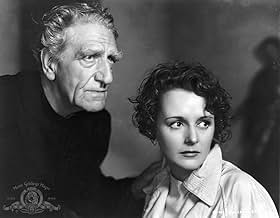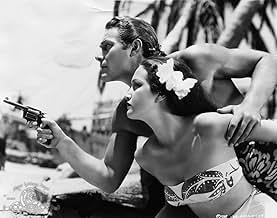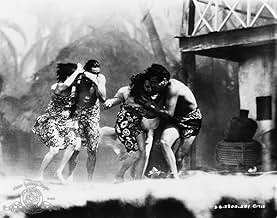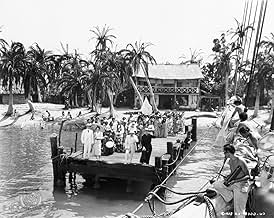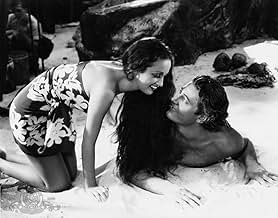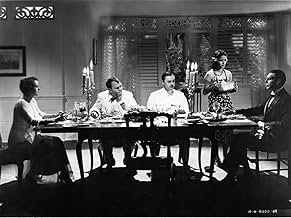PUNTUACIÓN EN IMDb
7,1/10
3,1 mil
TU PUNTUACIÓN
Un marinero polinesio, injustamente condenado por defenderse contra un colono abusivo, es perseguido incansablemente por el francés gobernador de la isla.Un marinero polinesio, injustamente condenado por defenderse contra un colono abusivo, es perseguido incansablemente por el francés gobernador de la isla.Un marinero polinesio, injustamente condenado por defenderse contra un colono abusivo, es perseguido incansablemente por el francés gobernador de la isla.
- Ganó 1 premio Óscar
- 1 premio y 2 nominaciones en total
Lionel Braham
- The Governor
- (sin acreditar)
John Casey
- Native
- (sin acreditar)
Spencer Charters
- Judge
- (sin acreditar)
Anne Chevalier
- Reri
- (sin acreditar)
Argumento
¿Sabías que...?
- CuriosidadesAccording to Life Magazine, special effects wizard James Basevi was given a budget of $400,000 to create his effects. He spent $150,000 to build a native village with a lagoon 200 yards long, and then spent $250,000 destroying it.
- PifiasAs the the hurricane bears down on the church with its flooding fury, some of the native islanders choose to escape the failing structure by making their way out clinging to a tied off rope. As one of the huge waves hits the rope, a couple of the women islanders get flipped over and appear to be drowning. During the flip, one of the women's sarong top gets pulled down from the special effects wave and for a split second there is a bare breast exposure which the censors didn't catch.
- Citas
DeLaage: You helped Terangi? My own priest?
Father Paul: I'm his priest too!
DeLaage: You helped a murderer!
Father Paul: I aided a man whose heart is innocent.
DeLaage: You've given aid to anarchy and bloodshed!
Father Paul: I'll answer for it.
- ConexionesFeatured in Movies Are Adventure (1948)
Reseña destacada
Directed by John Ford with an extraordinary eye for detail and with tremendous sympathy and sensuality, this picture will be a surprise for those who only know the later Ford films that explore the male worlds of military life on the frontier. In those, Ford seems to take the side of authoritarian severity, as if he had come to agree with the Raymond Massey character of THE HURRICANE, for whom human nature can and should be broken on the wheel of law. But in this earlier film you can feel Ford's deep yearning for the freedom and eroticism of a natural life of the body and the senses.
I grew up with THE HURRICANE, which was a staple of TV viewing throughout the '60s and '70s. But seeing it now for the first time in years I am struck by how subversive of convention it must have seemed in the '30s, and how much it was in sync with the cultural and political wars of the late '60s. Terangi, the kind, capable natural man wants merely to live freely and happily, but he is imprisoned and tortured and unwittingly finds himself in opposition to a rule of law that is anti-love, anti-life, anti-human. Every frame of this film sides with Dorothy Lamour and Jon Hall, the gorgeous young lovers, against the hard fanaticism of Massey's governor. Meanwhile the priest, the doctor, the sea captain and the governor's own wife are sensible, kind-hearted (if condescending) humanists who are on the correct side of the debate, but who are helpless in the face of insane obedience to authority.
Yes, the hurricane is marvelously done, impressive and absorbing, and it acts as a very necessary catharsis after the anxiety aroused by the many injustices Terangi must endure. But what seems to matter most to Ford is the idyll of sexy young love, not seen in films since the first two pre-code TARZAN pictures from MGM. Once married, the couple are stripped of their western clothes by their friends and returned to their near-naked state wearing sarongs and flower leis. It is Lamour's character who signals to her husband that she is ready for the honeymoon to begin, and the camera follows the happy couple to their private island where they lay in the sand to make love under palm trees. Just as sensual is the morning after, where Lamour raises the shades of their hut, letting the sun fall on her husband's naked back, and her hair falls around him as she leans down to kiss him tenderly on the neck. This must have been a powerful vision of romance and eroticism to workaday, Depression-weary audiences. The island scenes cast a naive spell, like something from Melville's early books of south sea island life. Ford films these like silent screen montages, with dissolving images of swaying palms, bare, tanned legs, the look of young, tawny bodies and shining hair. Rather than just a professional job for him, his work on THE HURRICANE seems deeply felt.
Lamour was just right here: Though not yet the wry comic actress she would become, she was rather gravely beautiful in a way unusual for an American star then and now, full of languor and sometimes a startling natural grace. The way Marama suddenly pulls her hair back from her face when first seeing Terangi after eight years is an expressive gesture, full of emotion. Hall was very appealing, with the grace of an athlete and for all his muscularity there is something feline about him. And for those aware of rumors that director Ford may have nursed closeted yearnings all his life (as revealed by Maureen O'Hara in her autobiography of 2005) the fevered way that Hall's body and face are photographed in the midst of his torments will have an added charge and interest.
I grew up with THE HURRICANE, which was a staple of TV viewing throughout the '60s and '70s. But seeing it now for the first time in years I am struck by how subversive of convention it must have seemed in the '30s, and how much it was in sync with the cultural and political wars of the late '60s. Terangi, the kind, capable natural man wants merely to live freely and happily, but he is imprisoned and tortured and unwittingly finds himself in opposition to a rule of law that is anti-love, anti-life, anti-human. Every frame of this film sides with Dorothy Lamour and Jon Hall, the gorgeous young lovers, against the hard fanaticism of Massey's governor. Meanwhile the priest, the doctor, the sea captain and the governor's own wife are sensible, kind-hearted (if condescending) humanists who are on the correct side of the debate, but who are helpless in the face of insane obedience to authority.
Yes, the hurricane is marvelously done, impressive and absorbing, and it acts as a very necessary catharsis after the anxiety aroused by the many injustices Terangi must endure. But what seems to matter most to Ford is the idyll of sexy young love, not seen in films since the first two pre-code TARZAN pictures from MGM. Once married, the couple are stripped of their western clothes by their friends and returned to their near-naked state wearing sarongs and flower leis. It is Lamour's character who signals to her husband that she is ready for the honeymoon to begin, and the camera follows the happy couple to their private island where they lay in the sand to make love under palm trees. Just as sensual is the morning after, where Lamour raises the shades of their hut, letting the sun fall on her husband's naked back, and her hair falls around him as she leans down to kiss him tenderly on the neck. This must have been a powerful vision of romance and eroticism to workaday, Depression-weary audiences. The island scenes cast a naive spell, like something from Melville's early books of south sea island life. Ford films these like silent screen montages, with dissolving images of swaying palms, bare, tanned legs, the look of young, tawny bodies and shining hair. Rather than just a professional job for him, his work on THE HURRICANE seems deeply felt.
Lamour was just right here: Though not yet the wry comic actress she would become, she was rather gravely beautiful in a way unusual for an American star then and now, full of languor and sometimes a startling natural grace. The way Marama suddenly pulls her hair back from her face when first seeing Terangi after eight years is an expressive gesture, full of emotion. Hall was very appealing, with the grace of an athlete and for all his muscularity there is something feline about him. And for those aware of rumors that director Ford may have nursed closeted yearnings all his life (as revealed by Maureen O'Hara in her autobiography of 2005) the fevered way that Hall's body and face are photographed in the midst of his torments will have an added charge and interest.
- tjonasgreen
- 7 may 2006
- Enlace permanente
Selecciones populares
Inicia sesión para calificar y añadir a tu lista para recibir recomendaciones personalizadas
- How long is The Hurricane?Con tecnología de Alexa
Detalles
Taquilla
- Presupuesto
- 2.000.000 US$ (estimación)
- Duración1 hora 44 minutos
- Color
- Relación de aspecto
- 1.37 : 1
Contribuir a esta página
Sugerir un cambio o añadir el contenido que falta

Principal laguna de datos
What is the German language plot outline for Huracán sobre la isla (1937)?
Responde


